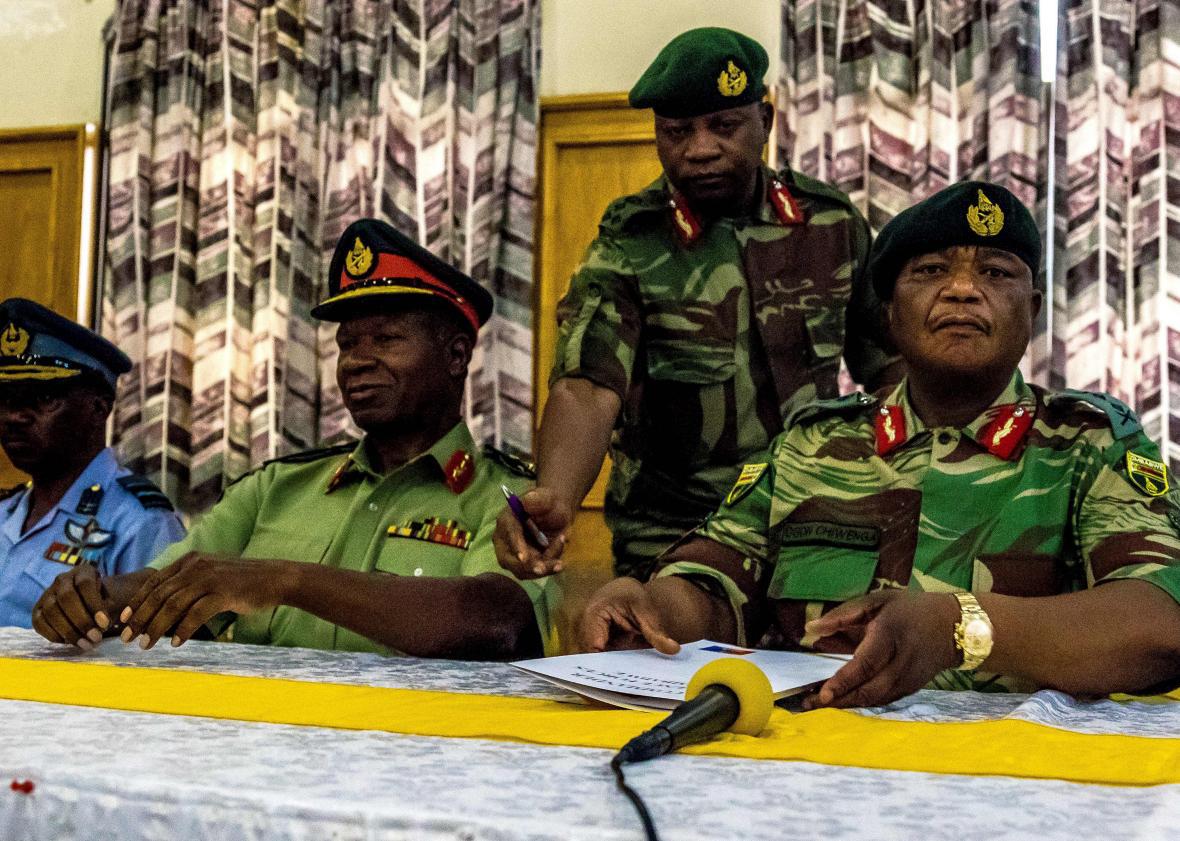It bears all the traditional signifiers of a military coup: a beret’d military commander addressing the media, flanked by fellow officers, armored vehicles headed toward the capital. But what’s really going on in Zimbabwe now?
The latest crisis kicked off last week when President Robert Mugabe fired powerful Vice President Emmerson Mnangagwa. Mnangagwa is a former intelligence chief and veteran of the 1970s guerrilla war against white minority rule and was widely seen as a likely successor to Mugabe. War veterans are a powerful constituency within the ruling Zimbabwe African National Union—Patriotic Front party. Mnangagwa’s removal was widely seen as a move to clear a path for Mugabe’s increasingly influential wife, Grace, to be named as his successor. Grace is a controversial figure at home and abroad, not only because of a recent high-profile incident in which she had to ignominiously flee from South Africa after allegedly beating a fashion model with an extension cord, but also because she has the backing of many younger members of the party.
Then on Monday, Gen. Constantino Chiwenga, a close ally of Mnangagwa’s who was considered a possible future vice president himself, called a press conference, denouncing moves to purge “members associated with our liberation history.” If the purge did not stop, he warned, “the military will not hesitate to step in.” On Tuesday, Reuters reported that two armored vehicles were seen headed toward the capital, Harare. While the country’s state-linked media has had little to no coverage of the events, the ZANU—PF Twitter account did issue this catty denial:
Blessing-Miles Tendi, a Zimbabwean lecturer in African history and politics at Oxford, told me he doubts Chiwenga has the clout to pull off a coup.
“Despite being the overall commander, he actually doesn’t have the degree of authority that one would assume. He’s always been seen as an extremely political commander. During the liberation war, he was a political commissar. For that reason, he hasn’t always had complete authority,” he said. “I very much doubt that what he had to say had wide resonance within the military itself.” In contrast to West Africa, southern Africa rarely sees coups, and regional governments have at times moved aggressively to prevent them.
Tendi says the fact that Chiwenga addressed the media before taking any military action doesn’t bode well for any attempt to take power. “You’d like to think when you issue such a show of warning that it’s a show of power, but it turned out to be a show of weakness,” he said. ZANU—PF’s youth wing moved quickly to condemn the general and call on troops to stay in their barracks.
However this crisis is resolved, Zimbabwe’s post-Mugabe future looms. At 93, he’s the oldest head of state in the world and in poor health, spending much of his time abroad to receive medical treatment, out of contact with his own government. Grace is now quite likely to take her place as one of the country’s two vice presidents before the end of this year, but Tendi says that doesn’t necessarily mean we should assume she will succeed her husband. While the Mugabes have worked effectively together to sideline political allies, Mugabe “tends to be quite sexist, quite misogynist. He’s never rated women as political leaders.”
Mugabe is likely to have a significant say in whoever takes power after him, and, as Tendi notes, “It’s very hard to know what’s in Robert Mugabe’s head.”
